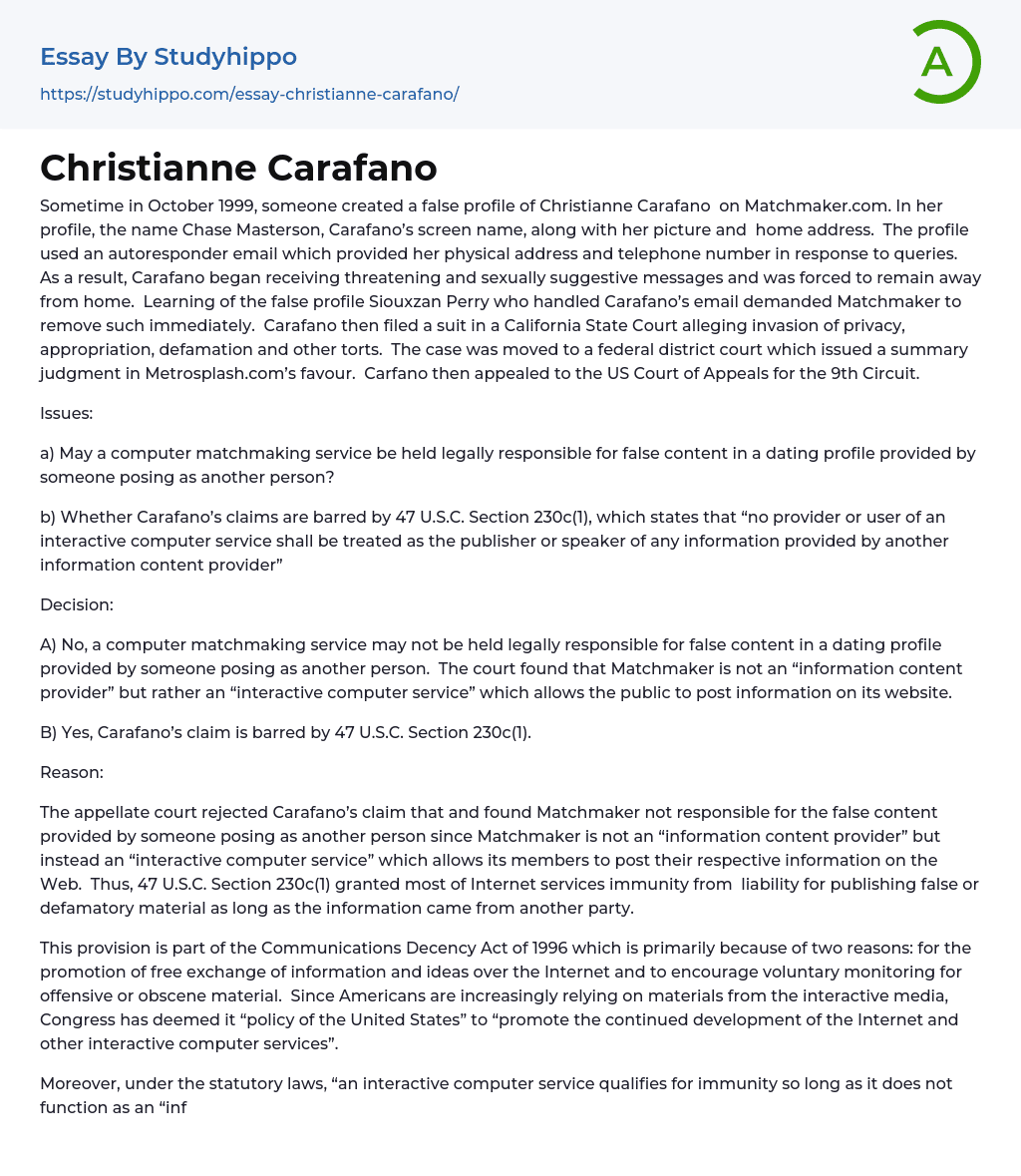Sometime in October 1999, someone created a false profile of Christianne Carafano on Matchmaker.com. In her profile, the name Chase Masterson, Carafano’s screen name, along with her picture and home address. The profile used an autoresponder email which provided her physical address and telephone number in response to queries. As a result, Carafano began receiving threatening and sexually suggestive messages and was forced to remain away from home. Learning of the false profile Siouxzan Perry who handled Carafano’s email demanded Matchmaker to remove such immediately. Carafano then filed a suit in a California State Court alleging invasion of privacy, appropriation, defamation and other torts. The case was moved to a federal district court which issued a summary judgment in Metrosplash.com’s favour. Carfano then appealed to the US Court of Appeals for the 9th Circuit.
Issues:
a) May a computer
...matchmaking service be held legally responsible for false content in a dating profile provided by someone posing as another person?
b) Whether Carafano’s claims are barred by 47 U.S.C. Section 230c(1), which states that “no provider or user of an interactive computer service shall be treated as the publisher or speaker of any information provided by another information content provider”
Decision:
A) No, a computer matchmaking service may not be held legally responsible for false content in a dating profile provided by someone posing as another person. The court found that Matchmaker is not an “information content provider” but rather an “interactive computer service” which allows the public to post information on its website.
B) Yes, Carafano’s claim is barred by 47 U.S.C. Section 230c(1).
Reason:
View entire sample
justify">The appellate court rejected Carafano’s claim that and found Matchmaker not responsible for the false content provided by someone posing as another person since Matchmaker is not an “information content provider” but instead an “interactive computer service” which allows its members to post their respective information on the Web. Thus, 47 U.S.C. Section 230c(1) granted most of Internet services immunity from liability for publishing false or defamatory material as long as the information came from another party.
This provision is part of the Communications Decency Act of 1996 which is primarily because of two reasons: for the promotion of free exchange of information and ideas over the Internet and to encourage voluntary monitoring for offensive or obscene material. Since Americans are increasingly relying on materials from the interactive media, Congress has deemed it “policy of the United States” to “promote the continued development of the Internet and other interactive computer services”.
Moreover, under the statutory laws, “an interactive computer service qualifies for immunity so long as it does not function as an “information content provider for the portion of the statement or publication at issue”. This immunity is attributed to the fact that Interactive computer services have million of users and it would be impossible for them to screen each of its members for possible problems. Since Congress deemed service providers such as Matchmakers as immune from suit, the claim must be rejected despite the serious consequences of the case.
- Baptism essays
- Holy Spirit essays
- Jesus Christ essays
- Adam And Eve essays
- Crucifixion Of Jesus essays
- Crusades essays
- Eucharist essays
- God The Father essays
- Pope essays
- Protestantism essays
- Christian essays
- Church essays
- Elizabeth essays
- Sacrament essays
- Catholic Church essays
- Lord essays
- Priest essays
- Protestant Reformation essays
- Federal government essays
- Armed Forces essays
- Confederate States Of America essays
- Federal Government Of The United States essays
- Fourteenth Amendment To The United States Constitution essays
- Governance essays
- Parliament essays
- Politics essays
- Jurisdiction essays
- Bureaucracy essays
- Separation Of Powers essays
- Congress essays
- President essays
- United States Congress essays
- Non-Commissioned Officer essays
- Appeal essays
- Revenge essays
- Corporate Governance essays
- Public Service essays
- Income Tax essays
- Supply essays
- Red Cross essays
- Democracy essays
- State essays
- Liberty essays
- Absolutism essays
- Reform essays
- Republic essays
- John Marshall essays
- Bourgeoisie essays
- Developed Country essays
- Elections essays




